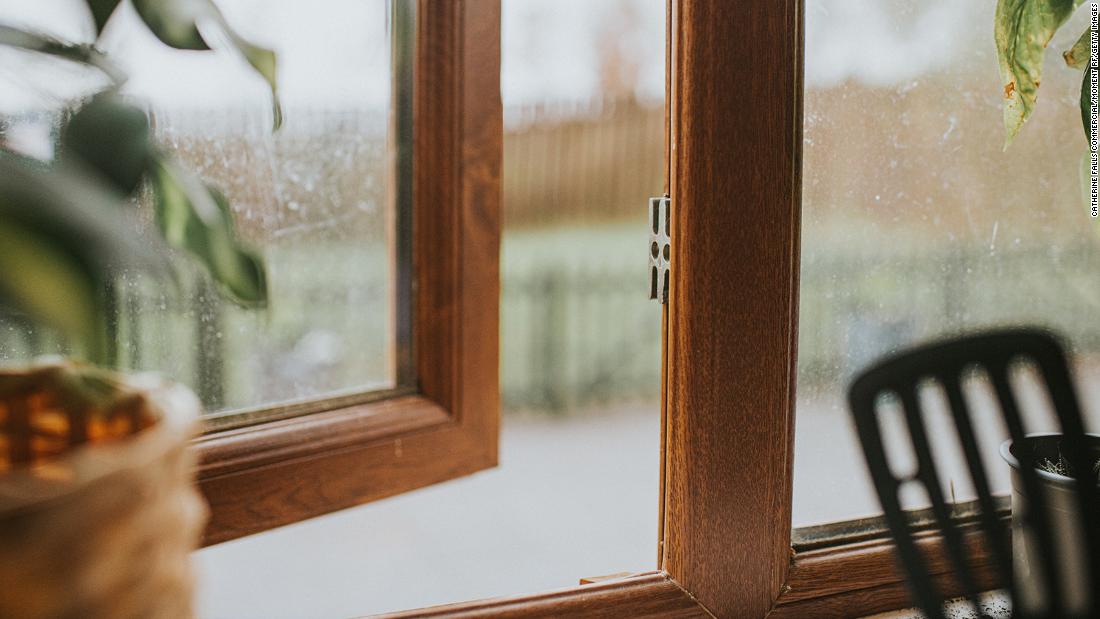"I could be smoking a cigarette, you could be a couple of feet from me, depending which way the wind was blowing, you may not even know I'm smoking."
If you're indoors, you could be breathing in less fresh air than you think.
"Everybody in a room together is constantly breathing air that just came out of the lungs of other people in that room. And depending on the ventilation rate, it could be as much as 3% or 4% of the air you're breathing just came out of the lungs of other people in that room," Allen said.
He describes this as respiratory backwash.
"Normally, that's not a problem, right? We do this all the time. We're always exchanging our respiratory microbiomes with each other. But if someone's sick and infectious ... those aerosols can carry the virus. That's a problem."
It's airborne
"We've known for decades how to keep people safe in buildings from infection, from airborne infectious diseases like this one," Allen said.
From the beginning of the pandemic, Allen and other experts have waved red flags, saying that the way we were thinking about transmission of Covid-19 -- surfaces, large respiratory droplets -- was missing the point.
"Hand washing and social distancing are appropriate but, in our view, insufficient to provide protection from virus-carrying respiratory microdroplets released into the air by infected people.
This problem is especially acute in indoor or enclosed environments, particularly those that are crowded and have inadequate ventilation," hundreds of scientists
stated in an open letter in July 2020.
Eventually, the World Health Organization and the US Centers for Disease Control and Prevention
acknowledged what the experts had been saying all along: that Covid-19 could also spread by small aerosolized particles that can travel more than 6 feet.
In Washington's Covid-19 outbreak, new variants flout old 'close contact' rule
The coronavirus itself is very small -- about 0.1 microns -- but that doesn't affect how far it can travel.
"The size of the virus itself doesn't matter because, as we say, the virus is never naked in air. In other words, the virus is always traveling in respiratory particles that develop in our lungs. And those are all different sizes," Allen said.
Singing or coughing can emit particles as large as 100 microns (almost the width of a human hair), he said, but the virus tends to travel in smaller particles -- between 1 and 5 microns.
The size of these particles affects not only how far it can travel but how deeply we can breathe it into our lungs, and how we should approach protecting ourselves from this virus.
"When you're talking about an airborne disease, there's the what's right around you, you know, the sort of the people who you know can cough in your face, the 6 feet thing, and then there's the broader indoor air, because indoor air is recirculated," said Max Sherman, a leader on the Epidemic Task Force for the American Society of Heating, Refrigerating and Air-Conditioning Engineers.
Dilute and clean
"Outdoors is safer than indoors" has become an accepted mantra with Covid-19. Allen points out that protecting ourselves indoors is where our focus should always be, even beyond the pandemic.
"We're [an] indoors species. We spend 90% of our time indoors. The air we breathe indoors has a massive impact on our health, whether you think about infectious disease or anything else, but it just has escaped the public consciousness for a long time," he said.
Making sure our indoor air is healthy is not that complicated, Sherman said. "You just want to reduce the number of particles that might be carrying Covid or any other nasty [virus]."
The way you do that is through ventilation and filtration.
Filtration -- just like it sounds -- is filtering or cleaning the air, removing the infected particles. But think of ventilation as diluting the air. You're bringing more fresh air in to reduce the concentration of those particles.
Dilution is exactly why we haven't seen superspreader events outdoors, Allen says.
"We have hardly any transmission outdoors. Why is that? Unlimited dilution, because you have unlimited ventilation. And so, even in crowded protests or outdoor sporting events like the Super Bowl, we just don't see superspreading happening. But if we did, we'd have the signal be loud and clear. We just don't see it.
It's all indoors in these underperforming, unhealthy spaces."
more:
Healthy spaces
With mask mandates virtually gone and vaccinaton rates at a standstill, there's one mitigation measure that can still make a big difference: ventilation.

www.cnn.com


